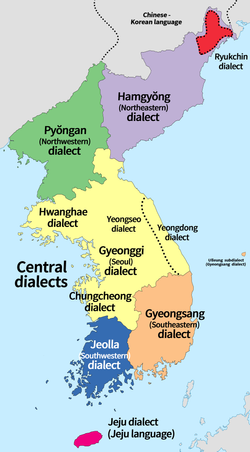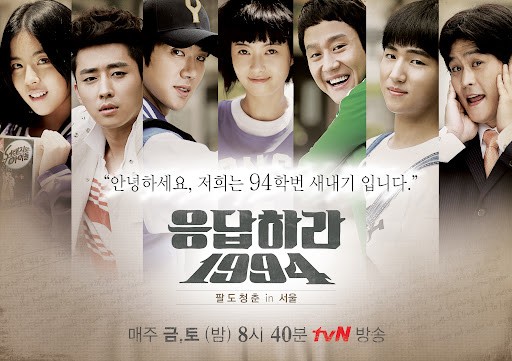Have you ever watched the Korean Drama ‘Answer Me Series’ or listened to the BTS song, ‘Paldogangsan’? International students at Dankook University (Dankookians) who have watched the program or listened to the music, would have heard all kinds of unfamiliar Korean words in different accents from the one they learned in Korean classes. ‘A language which is not chosen as an official language and only used in particular area’, is called Saturi in Korea. As K-culture grows in popularity nowadays, foreigners are coming across ‘saturi’ more often and feel embarrassed when do because they are unfamiliar with it. The Dankook Herald (DKH) looked into four different Korean regional dialects, hoping those who are interested in learning more unusual Korean expressions, can overcome their anxiety when faced by it.
 |
| ▲ There are five different regional dialects from Gangwon-do, Chungcheong-do, Gyeongsang-do, Jeolla-do, and Jeju-do. (A phtoto from Wikipedia) |
Korea has various types of saturi because of its mountainous terrain. The geography made it hard for people to move freely to other parts of the country, eventually leading to the formation of regional dialects. There are several ways to categorize saturi. The most popular is by ‘do’ or province. When we categorize by province, there are six different types of saturi: Seoul and Gyeonggi dialect which is the standard dialect, another from Gangwon-do, Chungcheong-do, Gyeongsang-do, Jeolla-do, and Jeju-do. The DKH interviewed four Dankookians who speak different dialects to learn more about common regional expressions where they come from.
 |
| ▲ Characters in 'Answer me 1994' from all across the country use regional dialects. (A photo from TVing) |
First, to learn a bit about the dialect from Jeolla-do, the DKH interviewed Kim Min-jeong, majoring in the Department of Political Science and International Relations. She recommends foreigners learn three commonly used expressions from the area. The first is ‘Geopna’. This means ‘very’, or ‘a lot’. It is used like ‘geopnake masitda’ which means ‘It’s delicious’ or ‘It’s very delicious.’ The second regional expression she suggests foreigners learn is ‘heobeollage’. This also means ‘very’, or ‘a lot’, but emphasizes them more than Geopna. You can use it as ‘Heobellage masitda’ to say ‘It is very delicious or ‘It is super delicious.’ The last expression from her region is ‘Jjoemman’. This means ‘just a little’. It is used like ‘Jjoemman deo haeboja’ which translates to ‘Let's do it just a little bit more.’ She also mentioned that people in Gwangju always add ‘Ya innya’ subconsciously when they talk. For example, they say, ‘Ya innya, Mwo meogeullae? This translates to ‘Hey, what do you want to eat?’ Secondly, they pronounce the character ‘ㅎ’ the same as ’ㄷ’. This means that ‘Mwohanya’ or ‘What is this?’ sounds like ‘Mwodeonya’ and ‘Mothae’ or ‘I can’t do it’ sounds like ‘Modae’. Lastly, another characteristic of her dialect is that they normally use a lot of filler words such as ‘Ome’ and ‘Atta’. In addition, she said that the accent is soft because they sticks the sounds to the parts of other words. For example, they say ‘Mwo haebeureosseo~’, ‘Mwo haetdaing’, ‘Mwo handi’, whereas people in Seoul would say ‘Mwohaesseo’.
Park Si-eun, who is also a student in the Department in Political Science and International Relations, talked about the Gyeongsang-do dialect. She also chose three expressions that she thinks foreigners should learn. The first is ‘Dandihaera’. It means ‘firmly’, ‘surely’ or ‘hard’. It can be used when referring to clothes or dressing up. For example, ‘dandi ipgo daenggira’ means to ‘dress up firmly.’ ‘Gongbu jom dandihaera’ means to ‘study hard.’ The second regional expression she mentioned is ‘Mandakko’. It is used when asking, ‘What are you doing?’ or ‘Mandakko irae sanno’. Lastly, we learned about the expression ‘Eueunda’. This means ‘I don't want to’. It is commonly used like ‘Eung ~ ueunda’ or ‘I see, but I don't want to.’ When asked if there was anything funny about her regional dialect, she said that the difference in accents was interesting. Residents from Gyeongsang-do have a different accent when pronouncing the number ‘2’ and the Korean character ‘E’. She said, “although all regions, except for Gyeongsang-do, say 2 and E the same, we say it a little differently.” She also pointed out that they pronounce ‘blueberry smoothie’ differently. She said, her friends in the capital area frequently asked her to say ‘blueberry smoothie’ because they are amused by her unique Gyeongsang-do accent. She finished the interview by saying that she appreciates hearing the different accents and finds it refreshing and interesting to talk to friends in the capital area.
For the Jeju-do dialect, we interviewed Kang Hyeon-ju majoring in Business Administration. She explained two expressions that she frequently uses in her daily life that people in other regions barely understand, ‘Jjokjapae’ and ‘Geujarak.’ First, the term ‘Jjokjapada’ means being cramped in a very narrow space. For example, ‘Jjokjapae. Yeopeuro ga!’ or ‘Move over. There is not much space!’ The next expression is ‘Geujarak’. It is a synonym for ‘Geu jeongdoro’ or ‘to that extent, as all that’ and ‘Geureoke or ‘so, like that’. This can be used when saying ‘Geujarak hwanael ireun aninde’ or ‘I don’t think it’s something to be so angry about.’ She also added that she often hears people say that she cuts off the end of her words, a common occurrence in Jeju-do. If ‘-ㅣ’ or ‘ㅓ-’ is the stem of the words, they add the consonant ‘ㄴ’ at the end of the word. For instance, they use ‘Jaemin’ instead of ‘Jaemisseo’ and ‘Masin’ instead of ‘Masisseo.’ On the other hand, if the stem of the forms is not ‘-ㅣ’ or ‘ㅓ-‘, then they add ‘Maen’ at the end of the word like ‘Mwohamaen’ or ‘What are you up to?’ Lastly, we asked her to explain the main characteristic of the Jeju-do dialect, and she said that it is important to cut words short like staccato rather than draw words out when speaking.
Jeong So-yeon, a student in the Department of Political Science and International Relations gave us a few tips about the Gangwon-do dialect. She said most of the expressions from Gangwon-do no longer exist or are just similar to the North Korean standard language, but some words have added a cute nuance, for example, a cat is ‘Gonaengi’ instead of ‘Goyangi’ and a white radish is ‘Mukku’ instead of ‘Mu.’ She also explained the difference between Yeongseo and Yeongdong district dialects. She said Youngseo is similar to the Seoul dialect while Yeongdong has more in common with the North Korean dialect. One of the features of Gangwon-do dialect is the distinction of sexes. For instance, when a man talks to a woman that has a sense of kinship with him, he will tend to use ‘Haoche’ which is a literary style in Korea. For example, he might say, ‘Akka Danyeowatjansso! or ‘I was there a while ago!’
Through these interviews with four different Dankookians, we learned more about the saturi used in various regions of the country. If you come across these expressions in your daily life, you need no longer worry about being embarrassed, because you now understand what they mean. We recommend you try pronouncing these expressions yourself, to become even more familiar with them.
Saturi is more than just ‘an accent used in somewhere in Korea’, because it is linked to ancient cultures and the lifestyles of a particular region. These unique words and accents enrich the Korean language. The Jeju-do dialect, however, was chosen as an endangered language by UNESCO in 2010 and other regional dialects are also gradually disappearing due to the increased use of social network services and the fact that the government’s language planning has focused on a standard Korean dialect. If Dankookians take an interest in learning these expressions, these endangered dialects, just might just have a chance to survive.
김서연, 권유지, 최은지 dankookherald@gmail.com

![[Campus Magnifier] Let's Surf the Library!](/news/photo/202404/12496_1765_4143.jpg) [Campus Magnifier] Let's Surf the Library!
[Campus Magnifier] Let's Surf the Library!
![[Campus Magnifier] Let's Surf the Library!](/news/thumbnail/202404/12496_1765_4143_v150.jpg)





